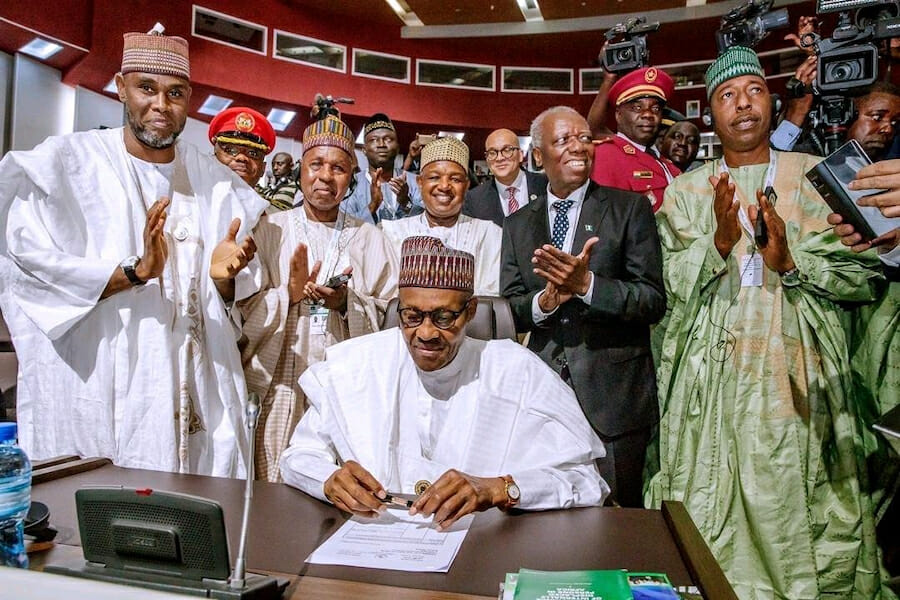
AfCFTA: Could this be the Time for Africa?
Clad in his signature all-white agbada with corresponding cap, Muhammadu Buhari, Nigeria’s president, signed the African Continental Free Trade Area (AfCFTA) agreement in Niamey, Niger on July 7, 2019. Nigeria officially became the 44th member of the AfCFTA. This decision took him over four months of consultation with, according to sources, manufactures and Nigerian trade unions.
The decision of Nigeria to sign the pact was greeted with excitement. According to Niger’s president, Issoufou Mahamadou, “Without Nigeria, the leading economic power of the continent, there would have been a taste of unfinished business.”
At the same signing ceremony, Benin also joined, leaving Eritrea as the only country which has not joined. However, only about half of the members have ratified the AfCFTA which became operational on May 30th.
The origin
The AfCFTA can be traced to the Lagos Plan of Action in 1980 and the Abuja Treaty of 1991, respectively, where the then Organisation of African Unity established an economic community for Africa. Then to January of 2012 when 44 heads of state met in Addis Ababa and agreed to establish a Continental Free Trade Area (CFTA). The goal was to launch in 2017.
This is in a bid to achieve the African Union’s Agenda 2063 which aims to accelerate Africa’s economic growth and development as well as promote a common identity by celebrating its shared history and culture.
It is “Africa’s blueprint and master plan for transforming Africa into the global powerhouse of the future. It is the continent’s strategic framework that aims to deliver on its goal for inclusive and sustainable development and is a concrete manifestation of the pan-African drive for unity, self-determination, freedom, progress and collective prosperity pursued under Pan-Africanism and African Renaissance,” the AU said of Agenda 2063.
Potential game-changer
The AfCFTA has been described by experts as a possible game-changer if implemented successfully. It aims to liberalise trade among African countries, significantly accelerate the growth of intra-Africa trade and use trade more effectively as an engine of growth and sustainable development by doubling intra-Africa trade, strengthening Africa’s common voice and policy space in global trade negotiations.
The AfCFTA will make Africa the world’s largest free trade area with a gross domestic product (GDP) worth about $2.14 trillion dollars. This is key because the population of Africa is expected to grow to about 2.6 billion by 2050.
The AfCFTA seeks to remove tariffs on 90 percent of goods. According to the UN Economic Commission for Africa (ECA), the removal of tariff and non-tariff barriers will increase intra-African trade by 52.3 percent by 2020. This increment will then lead to a generation of more employment opportunities. It will also facilitate better use of local resources for manufacturing and agriculture and increase access to cheaper products.
According to economists, free tariff access to a market as huge as Africa would encourage service providers and manufacturers to leverage economies of scale. Hence, the increase in demand will lead to an increase in production and a decrease in unit costs. This would mean consumers will pay less for products and services and businesses will expand operations.
The AfCFTA will also help diversify trade and encourage a move away from extractive commodities, such as oil and minerals, which have traditionally accounted for most of Africa’s exports.
Challenges
A major challenge to implementing the AfCFTA is poor infrastructure that dots Africa. More will need to be done to modernize Africa, according to Rwandan Minister of Trade and Industry, Vincent Munyeshyaka.
Beyond the challenge of infrastructure is the challenge of its impact on larger economies like Nigeria, Egypt, and South Africa. As expressed by Muhammadu Buhari, there is the fear that the agreement will impact negatively on the country’s economy and make it a dumping ground for sub-standard goods. It would, he said, impact negatively on the country’s growing industrial and agricultural sectors.
This is in tandem with Andrea Cofelice’s assertion in his research on the agreement’s opportunities and challenges that the harmonization of national priorities to achieve regional and global public goods will require firm political will, determination and coordinating efforts by African political leaders.
“Trade liberalization can also pose some challenges for governments in promoting competition in local markets as some firms that are taking advantage of economies of scale may grow faster than others and capture dominant positions in markets,” the United Nations Conference on Trade and Development (UNCTAD) said.
“In order to ensure a smooth transition during these episodes, complementary policies such as consumer protection and competition policies need to be put in place,” the body advised.

